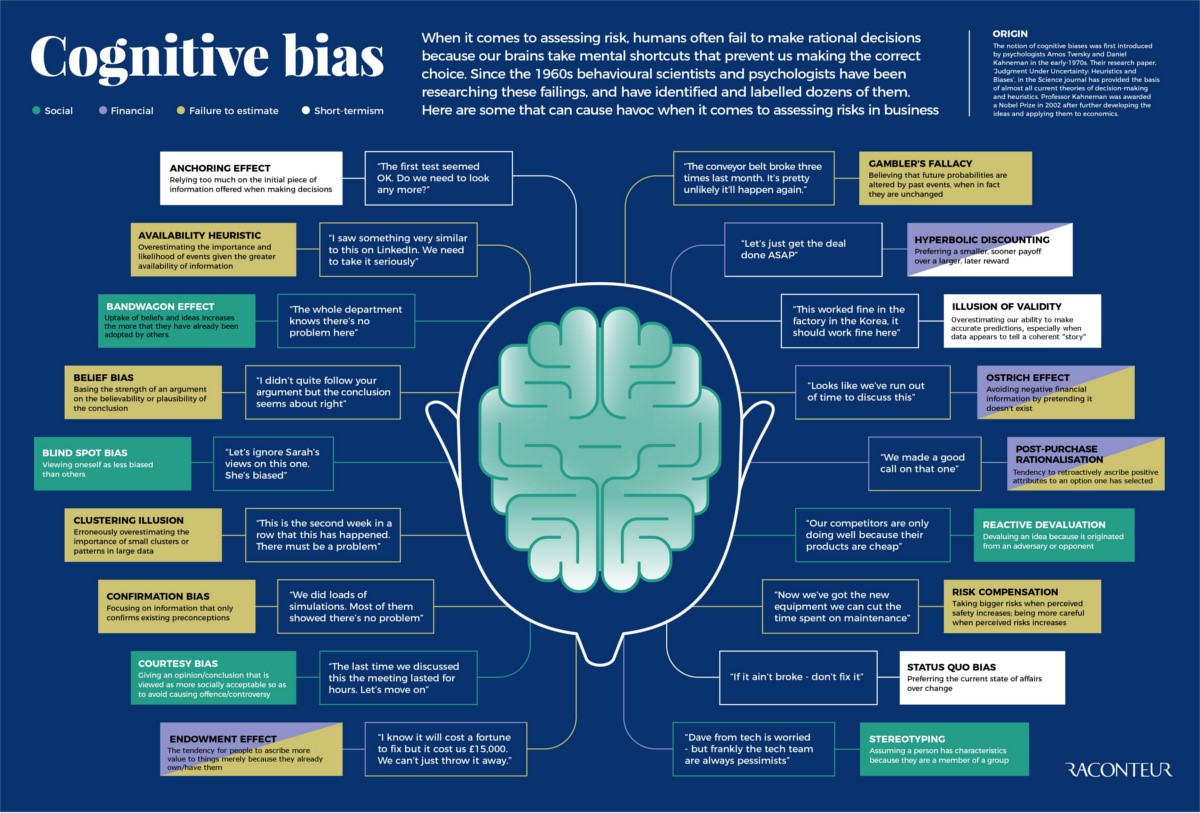Exploring the Multifaceted Nature of Cognitive Bias For Better Understanding
26th June 2023

Cognitive biases are inherent mental shortcuts and tendencies that can often lead to systematic errors in human judgment and decision-making. These biases arise due to our brain's natural inclination to simplify information processing, which can result in deviations from rational and objective thinking. Understanding the various types of cognitive biases is crucial for recognizing their impact and minimizing their influence on our daily lives.
Read on to explore some of the most common cognitive biases, while shedding light on why cognitive biases happen and their effects on perception, memory, and decision-making processes.
10 Of The Most Common Types Of Cognitive Biases
Here is a list of the few of the many types of cognitive biases that holds a strong influence on the way you think, feel, and behave:

- Confirmation Bias
Confirmation bias refers to our tendency to seek, interpret, and remember information in a way that confirms our pre-existing beliefs or hypotheses. People often subconsciously filter out evidence that contradicts their viewpoints, leading to the reinforcement of their existing beliefs and the formation of echo chambers.
Recognizing confirmation bias is essential for cultivating open-mindedness and fostering critical thinking skills.
- Anchoring Bias
Anchoring bias occurs when individuals rely too heavily on the initial piece of information encountered when making decisions. This bias often leads to an insufficient adjustment of subsequent judgments, resulting in inaccurate conclusions.
Marketers, negotiators, and decision-makers can exploit this bias to influence people's perceptions and choices.
- Availability Heuristic
The availability heuristic involves making judgments and decisions based on the ease with which specific examples or information come to mind. People tend to overestimate the likelihood of events or phenomena that are more readily available in their memory.
This bias can influence risk assessment, as vivid or recent examples may dominate one's perception of probability.
- Bandwagon Effect
The bandwagon effect describes the tendency for individuals to adopt certain beliefs or behaviors simply because many others are doing the same. People often conform to social norms or trends without critically evaluating the information or evidence.
The bandwagon effect can lead to herd mentality and hinder independent thinking.
- Gambler's Fallacy
The gambler's fallacy refers to the erroneous belief that previous random events can influence the probability of future events. For example, assuming that a coin flip is more likely to result in heads if it has landed on tails multiple times in a row.
This bias can lead to misconceptions about probability and affect decision-making in gambling, investing, and other domains.
- Halo Effect
The halo effect occurs when a person's overall impression of someone or something influences their judgments or evaluations of specific attributes. For instance, assuming that a physically attractive person is also intelligent or trustworthy.
The halo effect can lead to biased judgments in various contexts, such as job interviews, marketing, and politics.
- Overconfidence Bias
Overconfidence bias refers to the tendency for individuals to overestimate their abilities, knowledge, or judgment. People often exhibit unwarranted confidence in their predictions or assessments, which can lead to poor decision-making, excessive risk-taking, and failure to seek additional information.
Recognizing our limitations is crucial for mitigating the negative consequences of overconfidence bias.
- Sunk Cost Fallacy
The sunk cost fallacy is the tendency to continue investing in a decision or endeavor because of the resources (time, money, effort) already invested, even when the current situation suggests that the investment is no longer worthwhile.
This bias can lead to irrational persistence in unproductive pursuits, disregarding the opportunity cost of alternative choices.
- Hindsight bias
Hindsight bias, also known as the "I-knew-it-all-along" phenomenon, refers to our tendency to perceive past events as more predictable than they actually were. It involves distorting our memory and beliefs about what we knew or should have known before an event occurred.
When we look back at past events, we tend to overestimate our ability to have predicted the outcome accurately, neglecting the uncertainty and limited information available at the time. Recognizing this bias is crucial for maintaining objectivity and making better-informed choices.
- Optimism Bias
The optimism bias is a cognitive bias that leads individuals to believe that they are less likely to experience negative events and more likely to experience positive ones compared to others. It is a tendency to overestimate the likelihood of positive outcomes while underestimating the probability of negative outcomes.
This bias often stems from our desire for self-preservation and a need for positive self-perception. The optimism bias can affect various aspects of life, such as health, relationships, and career prospects.
Understand Your Bias To Act Accordingly
Cognitive biases are pervasive aspects of human cognition that can significantly impact our perception, memory, and decision-making processes. By understanding and recognizing these biases, we can strive for more rational and objective thinking, enhancing our ability to make informed judgments and decisions.
As teachers, you need to understand the types of cognitive biases as some of them are inevitable. For aspiring teachers, you can pursue a live online international teaching diploma to remain vigilant, challenge your assumptions, and seek diverse perspectives to minimize the influence of cognitive biases in your everyday lives.
Find the right course for you and try out the course. Call us at: 1800-212-6400. You can also mail us at act@asiancollegeofteachers.com
Written By: Bindita Sinha